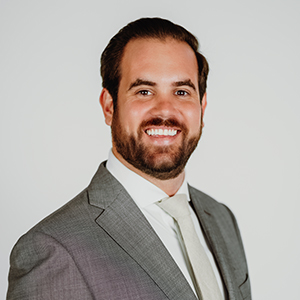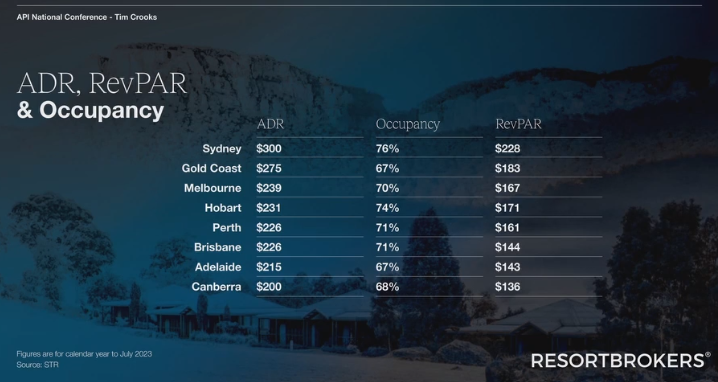22 Nov 2023
Words
Tim Crooks Australia & New Zealand Property Journal
There’s plenty of upside in Australia’s hotel market: Tim Crooks
Admittedly, the skyrocketing cost of materials, along with the lack of highly skilled trades is limiting the ability for new product to be delivered cost-effectively. But that said, this is a great time to get into accommodation and the smart money is investing now.

Tim Crooks, Director
0417 544 562
tim@resortbrokers.com.au
What’s exciting to me is how sharp the recovery has been [since covid], and how there is still so much room left there.
If you look at the 12-month growth average, it’s really only where we were 10 years ago, and if you were to project this average above, you would say there’s another 5 or 10 years of upside still to be enjoyed.
We also believe there’s still a lot of yield compression to be enjoyed in the accommodation sector when you compare it to other sophisticated asset classes.

Room for growth
I’m excited to see such sophisticated brands like the six-star Rosewood in Brisbane, the W Hotel which is now open Sydney , the Ritz Carlton in Melbourne, and Perth, and the Calile Hotel in Brisbane winning the best hotel in the Asia Pacific.
I’m incredibly proud of Australia, not just for having these amazing ultra-luxury brands being delivered not just in Sydney, but in multiple capital cities.
And when we talk about room for growth, if you’ve got the biggest hotel companies in the world investing in such brands in a multitude of cities, that speaks for itself in the confidence of the Australian hotel market.
It’s great to see Sydney with such a strong ADR (average daily rate) of $300/night at occupancy at 76%, but there’s still room for movement and it’s nice to see it recovering well.
The Gold Coast is also going incredibly well. There’s a hell of a lot of new product there and so to be achieving an ADR of $275/night is fantastic. But when you convert that into a RevPar (revenue per available room) and average out that occupancy – there’s a lot of scope for growth.

Brisbane which has almost stolen Melbourne's mojo is becoming the bleisure - business and pleasure - capital of Australia.
Then there’s Melbourne, which having had one of the toughest covid of any city in the world, lost its mojo a little, but it’s only a matter of time before it comes back.
Meantime, Brisbane which has almost stolen Melbourne’s mojo is becoming the bleisure – business and pleasure – capital of Australia.
Brisbane is genuinely becoming a viable alternative option to Sydney and Melbourne for the first time, and with Calile Hotel, Howard Smith Wharves Hotel and the Queens Wharf casino, we’re going to have many reasons for Brisbane not just being about business travel.

National breakdown
Between 2011 and 2021 the number of hotels across Australia increased 41% 6,000.
Across the country, there are 16,209 properties offering some sort of accommodation, with Qld having the most accommodation assets of any state, of which management rights account for 50%.

Let’s look at the three different operating models for hotels
1. Management rights model or serviced apartment offering
Peppers, Oaks, Sebel Residence and Mantra are examples of a management rights model.
It’s a great way of getting developments out of the ground where the land is expensive. That’s because it allows the developer to sell the apartments at the full residential retail rates, while then selling the management rights to an operator who can underpin a short-term return and furnish the units.
It’s a lower risk proposition than a traditional hotel that takes a number of years to mature, hence extending the risk profile uncertainty.
The only downside to management rights is you have to sell down the lots individually, and selling large volumes of individual strata titles is a challenge within the current market.
This is why companies like Hutchinson Building are less interested in strata title construction at the moment and much more focused on build-to-rent (BTR) or traditional product because the variation of independently owned apartments can become costly or harder to deliver.
2. Hotel leases
Are a great way of giving a bank certainty by underpinning the asset with a guaranteed rent.
Whether it’s through a Quest Apartment Hotel or a high net-worth individual, the bank has confidence in its ability to pay the rent. And that can unlock bank or alternative forms of funding to get new developments out of the ground.
The downside of this model is that for the landlord or the owner of that motel, the end value is capped by the rent.
That’s because there’s a capitalisation rate applied to the rent, so if the lessee is going to take more risk in the two to five years – while that asset is being established – they get to enjoy more of the upside when the asset is performing well.
Interestingly, we’ve had a 44% increase from much more sophisticated capital looking at the leasing model as a way of getting supply, especially in masterplan developments where they might be rewarded with more density if they are to deliver a hotel.
So while the hotel may not represent a large profit centre, it allows them to unlock the masterplan. The negative on leases is obviously that a lease or a guaranteed outgoing of rent can sit badly on a balance sheet for a public company.
So that’s why there’s only a certain number of companies that understand it and are willing to take that risk.
3. Hotel management agreement
This is really just an income split arrangement.
For example, 10 to 20 cents of every dollar goes to the hotel company but there is no guaranteed underpinned commitment from them.
Don’t get me wrong, a true international hotel brand can lead to true trophy assets. But an HMA will not get you bank funding.
So you often have a developer, construction partner or hotel investors that will then bring on the hotel brand.
The great thing about taking the risk on the front end or if you can have a hotel investor – or if you can take faith in yourselves to deliver the hotel – once it kicks, unlike the lease, you enjoy all the upside yourself instead of the lessee enjoying that income.

END
